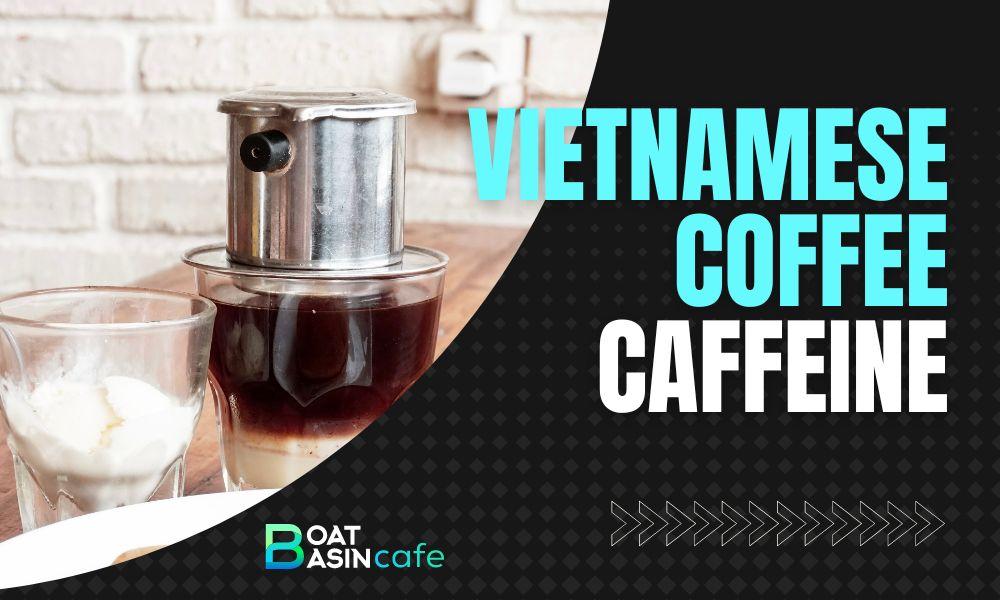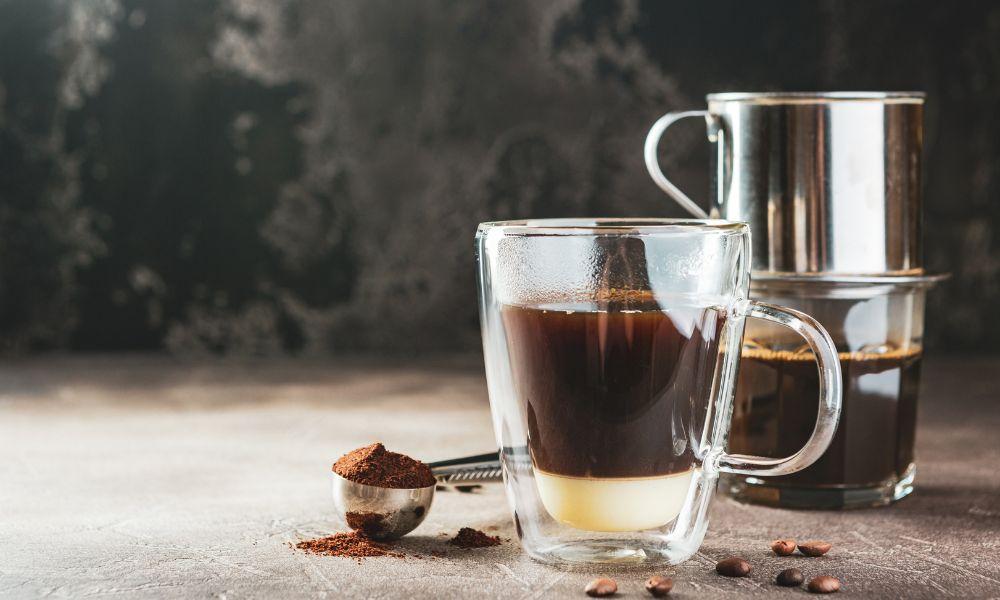Coffee is one of the most widely consumed beverages worldwide, and its popularity continues to grow. One type of coffee that has gained popularity in recent years is Vietnamese coffee. Vietnamese coffee is known for its strong and robust flavor, which is achieved by using a unique blend of Robusta and Arabica coffee beans and a specific brewing method.

Understanding the caffeine content of coffee is crucial for health reasons, as caffeine can have both positive and negative effects on the body.
In this article, we will discuss the amount of caffeine present in Vietnamese coffee, its benefits and side effects, and the factors that can affect its caffeine content. By the end of this article, readers will have a better understanding of Vietnamese coffee and its caffeine content, and how it can impact their health.
What is Vietnamese coffee?
Vietnamese coffee is a type of coffee that originates from Vietnam and is known for its strong and robust flavor. It is made using a unique blend of Robusta and Arabica coffee beans, which are often roasted with added butter or oil to give it a distinct taste. Vietnamese coffee is brewed using a unique filter called a phin, which is a small metal filter that sits atop a cup.
- Vietnamese coffee has a history that dates back to the French colonial era when the French introduced coffee to Vietnam.
- Over time, Vietnamese coffee has developed a unique flavor profile that is recognized worldwide.
- During the Vietnam War, coffee became an essential export for the country, and it continues to be a significant part of the Vietnamese economy today.
- Vietnamese coffee has gained popularity around the world due to its unique taste and brewing method.
- It is often served with condensed milk, which gives it a sweet and creamy taste.
- Vietnamese coffee has become a popular beverage in coffee shops worldwide.
- Many people enjoy Vietnamese coffee as an alternative to traditional coffee.
Key ingredients of Vietnamese coffee

Vietnamese coffee is made using a blend of Robusta and Arabica coffee beans, which are often roasted with added butter or oil to give it a distinct taste. This combination of coffee beans gives Vietnamese coffee its strong and robust flavor, which is different from other types of coffee.
Robusta coffee beans, which are commonly used in Vietnamese coffee, have a higher caffeine content than Arabica coffee beans, which are commonly used in other types of coffee. Robusta beans also have a more bitter taste than Arabica beans, which can contribute to the bold flavor of Vietnamese coffee.
The use of butter or oil in the roasting process is another unique aspect of Vietnamese coffee. This practice is not commonly used in other types of coffee and can contribute to the unique taste and aroma of Vietnamese coffee.
Additionally, the brewing method of Vietnamese coffee is different from other types of coffee. Vietnamese coffee is often brewed using a phin, a small metal filter that sits atop a cup. This method of brewing allows for a slow extraction of the coffee, resulting in a strong and robust flavor.
Vietnamese Coffee Popular Brands

There are several popular brands and types of Vietnamese coffee available, both in Vietnam and around the world. Some of the most popular brands of Vietnamese coffee include Trung Nguyen, Highlands Coffee, and Nguyen Coffee Supply.
Trung Nguyen is perhaps the most well-known brand of Vietnamese coffee, and it offers a range of coffee blends, including the famous “Gourmet Blend” and “Legendee” blends. The Gourmet Blend is a combination of Arabica, Robusta, and Excelsa coffee beans, while the Legendee blend is a premium blend that undergoes a special aging process.
Highlands Coffee is another popular brand of Vietnamese coffee that has gained popularity both in Vietnam and abroad. The brand offers a range of coffee blends, including the “Vietnamese Iced Coffee” blend, which is designed to be served with condensed milk.
In addition to these popular brands, there are several types of Vietnamese coffee available, including traditional Vietnamese coffee, which is brewed using a phin and served with condensed milk, and Vietnamese iced coffee, which is served over ice and mixed with condensed milk. Some coffee shops also offer variations of Vietnamese coffee, such as coconut Vietnamese coffee or salted caramel Vietnamese coffee.
How much caffeine is in Vietnamese coffee?
The caffeine content of Vietnamese coffee can vary depending on various factors such as the type of coffee beans used, the roasting level, and the brewing method. On average, an 8-ounce cup of Vietnamese coffee contains around 200mg of caffeine, which is higher than other types of coffee, such as drip coffee, which contains around 100-150mg of caffeine per 8-ounce cup.
| Type of Coffee | Caffeine Content per 8-ounce Serving |
|---|---|
| Vietnamese | around 200 mg |
| Drip | around 95 mg |
| Regular | varies, but generally around 95 mg |
However, it is essential to note that caffeine content can vary depending on the type of coffee beans used, the roasting level, and the brewing method. For example, Robusta coffee beans used in Vietnamese coffee contain higher levels of caffeine than Arabica coffee beans. Additionally, darker roasts tend to have lower caffeine levels than lighter roasts.
It is also important to note that the caffeine content of Vietnamese coffee can be impacted by the brewing method. Vietnamese coffee is often brewed using a phin, which can extract more caffeine from the coffee grounds than other brewing methods. As a result, the caffeine content of Vietnamese coffee brewed using a phin may be higher than other types of coffee brewed using different methods.
Is Vietnamese coffee stronger than regular coffee?
Vietnamese coffee is known for its strong and robust flavor, which is achieved through a unique blend of Robusta and Arabica coffee beans and a specific brewing method. However, the term “stronger” can be subjective, and it depends on how one defines “strength” in coffee.
In terms of caffeine content, Vietnamese coffee can be considered stronger than regular coffee. Vietnamese coffee typically contains higher levels of caffeine than other types of coffee, such as drip coffee. See the caffeine comparison table above.
However, when it comes to flavor and taste, whether or not Vietnamese coffee is stronger than regular coffee is a matter of personal preference. Vietnamese coffee has a distinct taste profile that is achieved through a unique blend of coffee beans and a specific brewing method, which can result in a strong and bold flavor. However, other types of coffee, such as espresso, can also be considered strong due to their concentrated flavor and high caffeine content.
Health effects of caffeine in Vietnamese coffee
One study on the effects of caffeine consumption on health found that it can have both positive and negative effects.
Caffeine is a natural stimulant found in coffee, including Vietnamese coffee, and can have both positive and negative effects on health.
Positive Effects
Positive effects of caffeine in Vietnamese coffee include improved mental alertness, increased physical performance, and a reduced risk of certain diseases, such as Parkinson’s disease, Alzheimer’s disease, and type 2 diabetes.
Negative Effects
However, consuming high amounts of caffeine, including the caffeine found in Vietnamese coffee, can also have negative effects on health. These negative effects can include insomnia, anxiety, restlessness, and an increase in blood pressure. Additionally, consuming high amounts of caffeine can also lead to dehydration, as caffeine is a diuretic that can increase urine production.
It is important to note that the negative effects of caffeine in Vietnamese coffee can vary depending on individual sensitivity to caffeine and the amount consumed. Individuals who are sensitive to caffeine or have certain medical conditions, such as high blood pressure, may need to limit their caffeine intake or avoid high-caffeine coffee blends, such as Vietnamese coffee.
FAQs
Can I drink Vietnamese coffee while pregnant?
Pregnant women are generally advised to limit their caffeine intake to no more than 200mg per day. An 8-ounce cup of Vietnamese coffee typically contains around 200mg of caffeine, so pregnant women should exercise caution when consuming Vietnamese coffee. It is always best to consult with a healthcare professional before consuming any caffeinated beverages during pregnancy.
Is Vietnamese coffee bad for my health?
Vietnamese coffee, like any other type of coffee, can have both positive and negative effects on health. While the caffeine in Vietnamese coffee can provide several health benefits, such as improved mental alertness and reduced risk of certain diseases, consuming high amounts of caffeine can also have negative effects on health, such as insomnia and an increase in blood pressure. It is important to manage caffeine intake and be aware of individual caffeine sensitivity to enjoy the benefits of Vietnamese coffee while minimizing the risks.
How does the caffeine content in Vietnamese coffee compare to other popular types of coffee?
Vietnamese coffee typically contains higher levels of caffeine than other types of coffee, such as drip coffee. An 8-ounce cup of Vietnamese coffee contains around 200mg of caffeine, while an 8-ounce cup of drip coffee contains around 100-150mg of caffeine. However, the caffeine content can vary depending on the type of coffee beans used, the roasting level, and the brewing method.
Can I drink Vietnamese coffee if I have a caffeine sensitivity?
Individuals with caffeine sensitivity may need to limit their caffeine intake or avoid high-caffeine coffee blends, such as Vietnamese coffee. It is best to consult with a healthcare professional to determine individual caffeine sensitivity and manage caffeine intake accordingly.
What are the best brewing methods for reducing caffeine content in Vietnamese coffee?
The caffeine content in Vietnamese coffee can be impacted by the brewing method. Using a different brewing method, such as drip coffee or pour-over, can result in lower caffeine levels in the final product. Additionally, using a decaffeinated coffee blend can also reduce caffeine content in Vietnamese coffee. It is important to note that the taste and flavor of the coffee may be impacted by changes in the brewing method or coffee blend used.
Conclusion
In conclusion, Vietnamese coffee is a unique and popular type of coffee that is known for its strong and robust flavor. The key ingredients and brewing method used in Vietnamese coffee differentiate it from other types of coffee and contribute to its distinct taste profile. Understanding the caffeine content of Vietnamese coffee is crucial for managing caffeine intake and making informed decisions about coffee consumption. While caffeine can provide several health benefits, consuming high amounts of caffeine can also have negative effects on health. By being aware of the caffeine content of Vietnamese coffee and managing caffeine intake accordingly, individuals can enjoy the benefits of caffeine while minimizing the risks.
We hope that this article has provided valuable insights into the caffeine content of Vietnamese coffee and its impact on health. We encourage readers to share their thoughts and experiences with Vietnamese coffee and to continue learning about the unique and diverse world of coffee.